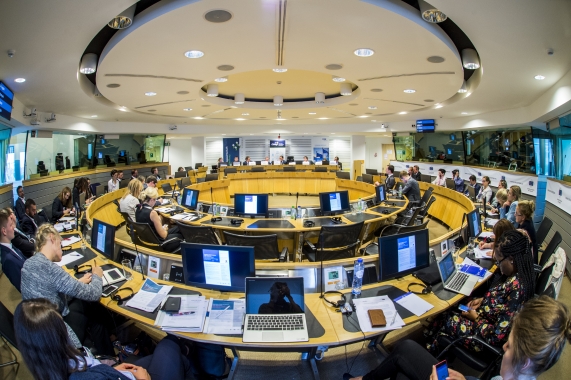Who will be a small and medium-sized enterprise in the future?
Report from the GdW event on the Revision of the European SME-definition
Brussels, 2 July 2018 | Published in Economy
Housing Europe German member organisation, GdW held an event in Brussels, at the European Committee of the Regions on June 5th to discuss the revision of the European SME-definition. The exemption of small and medium-sized enterprises from the SME definition constitutes a significant disadvantage in Europe. As a result, small and medium-sized companies are unduly burdened with additional costs due to the exclusion from SME privileges or certain promotion programmes. 15 years ago, in its recommendation of 2003, the Commission argued that companies with public participation obtain certain, especially financial benefits, compared to companies which are financed with private capital. The Commission assumed that it is often not possible to calculate the relevant personnel and financial data for public sector bodies or bodies governed by public law.
In her opening address Valeria Ronzitti, General Secretary of CEEP, emphasized the missed opportunity for Europe’s growth and jobs, if the current SME-definition is not changed. The current situation does not allow public companies to build the infrastructure for private industry and SMEs to grow.
The SME-definition shows far reaching consequences, Karl-Heinz Lambertz, president of the Committee of Regions (CoR) and host of the event, stated. A level playing field for public companies is needed in a world where the principle of competition dominates political discussions and public services do not play a big role anymore. In the past, the public service pillar was thought not to be necessary anymore, but present times show the consequences. In his view there is a need to define a new relationship between public and private service sector and a need for enlarging the scope of Services of General (Economic) Interest. The CoR calls for a European Agenda for Housing and for broadening the definition of social housing. Furthermore the CoR wants a strong cohesion policy as the main EU investment policy within an ambitious Multiannual Financial Framework. Currently Local Public Companies are prevented from having the same competition conditions as private companies. But in fact public companies are often organized as private organizations – therefore the call for an amendment to the SME-definition is understandable. In Lambertz´ view things are starting to move.
Axel Gedaschko, president of GdW Housing Germany showed that 95% of all housing companies represented by GdW match the size-criteria from the definition of small and medium-sized companies as laid out in article 2 of the Commission’s recommendation (2003/361/EG).
A distinction is made though, when companies have at least 25% of the capital or its voting rights directly or indirectly owned by one or more public bodies or public-law entities. This distinction is based on the idea that, through public participation, companies can obtain certain, in particular financial benefits, in contrast to companies that finance themselves through private capital.
The exclusion of small and medium-sized housing companies from the SME definition constitutes a significant disadvantage for these companies in Germany. As a result, small and medium-sized housing companies are excessively burdened with additional costs.
Gedaschko explained that in the European Commission's User Guide for the definition of SMEs it is argued, that even a very small company has access to substantial additional resources, because it is owned, intertwined or partnered with a larger company. It is also stated that it is often not possible to calculate the relevant personnel and financial data for public sector bodies or bodies governed by public law.
However, this reasoning does not apply to municipal housing companies in Germany. The autonomy of public and municipal housing companies in Germany is determined by their legal form. Thus, they are subject to requirements that do not arise for comparable companies and there is no mixing of the sphere between company and shareholder.
In a new European SME definition, Gedaschko argued, public and municipal companies shall be treated as SMEs as they operate independently in a legal form of a capital company, that are independent in terms of finances and personnel and that meet the SME size criteria, regardless of their ownership structure.
Different types of SMEs need different approaches was the key message of the rapporteur of the parliamentary initiative report on the SME definition, Dr Markus Pieper, MEP. In his opinion it is necessary to cut red-tape and find special SMEs exemptions, for example for Energy renovation quotas. There is too much bureaucracy for SMEs to deal with at the moment. Mr Pieper highlighted the needs of SMEs, especially when it comes to exemptions on the data protection regulation. For him it is not understandable, that they had been denied by fellow colleagues. Concerning the SME definition Mr Pieper reported that in general there was a rather unexpected resistance on an updated SME definition in the EP. But for him new criteria, an update of the thresholds and a definition of midcaps are needed, in order to support start-ups as well as joint ventures and to help midcaps.
There are 25.000 local public companies in Europe in all kinds of sectors providing public services under private law, CEEP Public Services Board chair Thierry Durnerin underlined. 16.000 fulfil the criteria for SMEs but their ownership leads to the exclusion of financial tools and the simplification of rules. This was contrasted by firstly a change of times that would make it necessary to also change legislation and views. The 2008 Small Business Act made SMEs move to the top of the list “thinking small first”. Second, Public SMEs are companies in service of other companies and SMEs. Third, they do not match the stereotype of a big state owned company, but they do meet the same challenges as private companies. As a fourth point, there would be no demand for a positive discrimination he said. Public SMEs only call for an end to the negative discrimination and the possibility to benefit from simplification. As his fifth and last point he brought to attention that the share of public SMEs in the total number of companies is small. There is no danger in including them.
Andreas Meyer from VKU focused on the general feature of SMEs to be able to react faster than big companies. There are two groups of public companies: On the one hand there are local small SGI suppliers that focus on the well-being of the citizens guaranteeing public life and satisfying basic needs – services not attractive for big companies. On the other hand there are those services to be bought on liberalized markets – such as in the energy sector. Many of these fulfil the criteria, however they do not count as SMEs. They act on the same markets but under a different set of rules, which to him is not acceptable. For example public energy suppliers compete with big energy companies but do not have the same size. Direct competitors need the same rules. SGI are not interesting for private companies. If they were treated as private, they’d maybe be just as efficient.
The European Commission is in the early designing stage of the new SME-definition, Commission advisor Constantinos Andropoulos from DG Grow explained. Things have evolved within the last 15 years since the publication of the current definition. Now, the analysis is important. Member States do not have the same structures for SMEs. Leading principle for the definition is simplicity as the final outcome has to be as simple as possible in order to allow its proper use. There are further considerations concerning the companies’ need for legal certainty and a level playing field, the real challenges needed to be identified, justifications to adjust ceilings as a reaction to e.g. inflation, the use of article 6 in the recent appeal to the general court, the need for scale-ups to keep the SME-status for a while when grown out of the criteria in exchange for staying in the EU, the correctness of the criteria, the possibility for allowing higher capitalization, the possibility of more diverse ownership structures and the acceptance of allowing public participation. The Commission’s public consultation had received about 1.000 replies and provides insight into different aspects. There’s a big discussion in the Commission as all different DGs are somehow affected. The issues discussed are likely to arrive at the regulatory scrutiny board by the end of the year. Follow-up action could be taken on by the current Commission or the new Commission after the 2019 European elections. The latter case might even be able to allow for a deeper discussion. The Commission will decide how to go on. But as most of the enterprises in Europe are affected, the Commission wants to listen to all arguments. There is need to get it right, said Andropoulos. He has not heard about anything better than what we already have. The Commission does not want to support companies’ holding constructions to qualify as SMEs but the real SMEs only.
In the open Q&A session the panellists faced questions from the audience and the moderators Christina Overmeyer, Head of EU Politics and International Affairs of VKU, and Dr Özgür Öner, Brussels Director of GdW Housing Germany.
Read MoreValeria Ronzitti pointed out that CEEP members fall under the real SMEs that need SME-support, but which is not granted. Also she raised the question whether a Commission recommendation is the right way to go forward or maybe a co-decision procedure would be the better way.
When asked what would happen if no changes were made to the definition, Axel Gedaschko answered that the public sector is usually the first to act, but does not receive the support. Consequently, in the housing sector the tenants will have to pay the difference in the end. Thus it is likely the most vulnerable tenants will pay for it.
Whether some Member States are more affected than others, Thierry Durnerin explained that some have been more active at the beginning of the discussion, but at this point everybody has gotten highly involved, probably everywhere as it affects all countries in the same way.
Andreas Meyer was asked for concrete examples and mentioned the Energy Peak compensation: a special tax discharge which is a matter of state aid. SMEs only need an energy audit report, but public SMEs must invest in expensive energy management systems and cannot make use of peak compensation.
What the Commission thinks about the additional exemption criteria mentioned, Constantinos Andropoulos answered by underlining not all Member States are the same. There is no answer yet, but the Commission will look into it. At this time no one could say it wouldn’t open the door for “not real SMEs” and wondered whether the Member States could solve this more efficiently individually as additional criteria will increase complexity of the ownership structure.
There are many references in national legislations to the EU definition – but there are not many voices for a change of procedure. A Council agreement is unlikely due to differences in the Member States. On the consultation results, Andropoulos stated no mathematical formula is available to reflect the different aspects, but there would be need to evaluate on a European level to see, if the benefits outweigh the downside. For demonstrating local public enterprises are real SMEs, he said that in a policy creation process it is important to build proof: provide data and if the data cannot be argued against, solutions become clearer. Commission will listen. On a legislative impact check, there are hundreds of legislation procedures affected in all General Directorates of the Commission, each with its own unique perspective on it.
Axel Gedaschko described the necessity to have both, public and private service providers. Similar to the car industry, different people with different demands have a need for different cars. Germany is a country of tenants. Different types of tenants need different types of offers. Social providers take care of the more vulnerable groups, refugees, and urban development. Cooperative providers offer long life living solutions. Different aims need different companies.
On the need for a EU-level definition, Thierry Durnerin explained it was impossible to go from having a EU definition to not having one. But there is need for a new proposal.
The event closed with the question on a fully harmonized EU-level SME definition, which to Constantinos Andropoulos would be paradise. Unfortunately, it is not a very realistic option as economies are different in different Member States. But there is need for a common denominator and to go from there. If it is to stay a recommendation, harmonisation will not be possible. Valeria Ronzitti sees instead of paradise the need for a minimum common denominator that leaves flexibility at the national level. Axel Gedaschko felt it could paradise, if all concerns were alike. Whereas Andreas Meyer saw quite a high level of harmonisation already and no need to further harmonise. Thierry Durnerin wondered if ownership criterion is against the treaty, why it is needed. Constantinos Andropoulos replied it is guaranteeing genuine SMEs and not bigger companies benefitting from SME regulation by building structures for exactly that. Moreover, the public hand is still controlling public companies in some Member States, not in all.
On the question what the criterion asked for would be in order to exempt public companies, the panellist summed up the day agreeing that equal treatment in direct competition with private companies is wanted, but no exemption is asked for. There are 25.000 local public companies in Europe, but not all are SMEs. The big ones do not even want to be recognised as SMEs.
Valeria Ronzitti pointed out that CEEP members fall under the real SMEs that need SME-support, but which is not granted. Also she raised the question whether a Commission recommendation is the right way to go forward or maybe a co-decision procedure would be the better way.
When asked what would happen if no changes were made to the definition, Axel Gedaschko answered that the public sector is usually the first to act, but does not receive the support. Consequently, in the housing sector the tenants will have to pay the difference in the end. Thus it is likely the most vulnerable tenants will pay for it.
Whether some Member States are more affected than others, Thierry Durnerin explained that some have been more active at the beginning of the discussion, but at this point everybody has gotten highly involved, probably everywhere as it affects all countries in the same way.
Andreas Meyer was asked for concrete examples and mentioned the Energy Peak compensation: a special tax discharge which is a matter of state aid. SMEs only need an energy audit report, but public SMEs must invest in expensive energy management systems and cannot make use of peak compensation.
What the Commission thinks about the additional exemption criteria mentioned, Constantinos Andropoulos answered by underlining not all Member States are the same. There is no answer yet, but the Commission will look into it. At this time no one could say it wouldn’t open the door for “not real SMEs” and wondered whether the Member States could solve this more efficiently individually as additional criteria will increase complexity of the ownership structure.
There are many references in national legislations to the EU definition – but there are not many voices for a change of procedure. A Council agreement is unlikely due to differences in the Member States. On the consultation results, Andropoulos stated no mathematical formula is available to reflect the different aspects, but there would be need to evaluate on a European level to see, if the benefits outweigh the downside. For demonstrating local public enterprises are real SMEs, he said that in a policy creation process it is important to build proof: provide data and if the data cannot be argued against, solutions become clearer. Commission will listen. On a legislative impact check, there are hundreds of legislation procedures affected in all General Directorates of the Commission, each with its own unique perspective on it.
Axel Gedaschko described the necessity to have both, public and private service providers. Similar to the car industry, different people with different demands have a need for different cars. Germany is a country of tenants. Different types of tenants need different types of offers. Social providers take care of the more vulnerable groups, refugees, and urban development. Cooperative providers offer long life living solutions. Different aims need different companies.
On the need for a EU-level definition, Thierry Durnerin explained it was impossible to go from having a EU definition to not having one. But there is need for a new proposal.
The event closed with the question on a fully harmonized EU-level SME definition, which to Constantinos Andropoulos would be paradise. Unfortunately, it is not a very realistic option as economies are different in different Member States. But there is need for a common denominator and to go from there. If it is to stay a recommendation, harmonisation will not be possible. Valeria Ronzitti sees instead of paradise the need for a minimum common denominator that leaves flexibility at the national level. Axel Gedaschko felt it could paradise, if all concerns were alike. Whereas Andreas Meyer saw quite a high level of harmonisation already and no need to further harmonise. Thierry Durnerin wondered if ownership criterion is against the treaty, why it is needed. Constantinos Andropoulos replied it is guaranteeing genuine SMEs and not bigger companies benefitting from SME regulation by building structures for exactly that. Moreover, the public hand is still controlling public companies in some Member States, not in all.
On the question what the criterion asked for would be in order to exempt public companies, the panellist summed up the day agreeing that equal treatment in direct competition with private companies is wanted, but no exemption is asked for. There are 25.000 local public companies in Europe, but not all are SMEs. The big ones do not even want to be recognised as SMEs.
The procedure is still open for further input.



